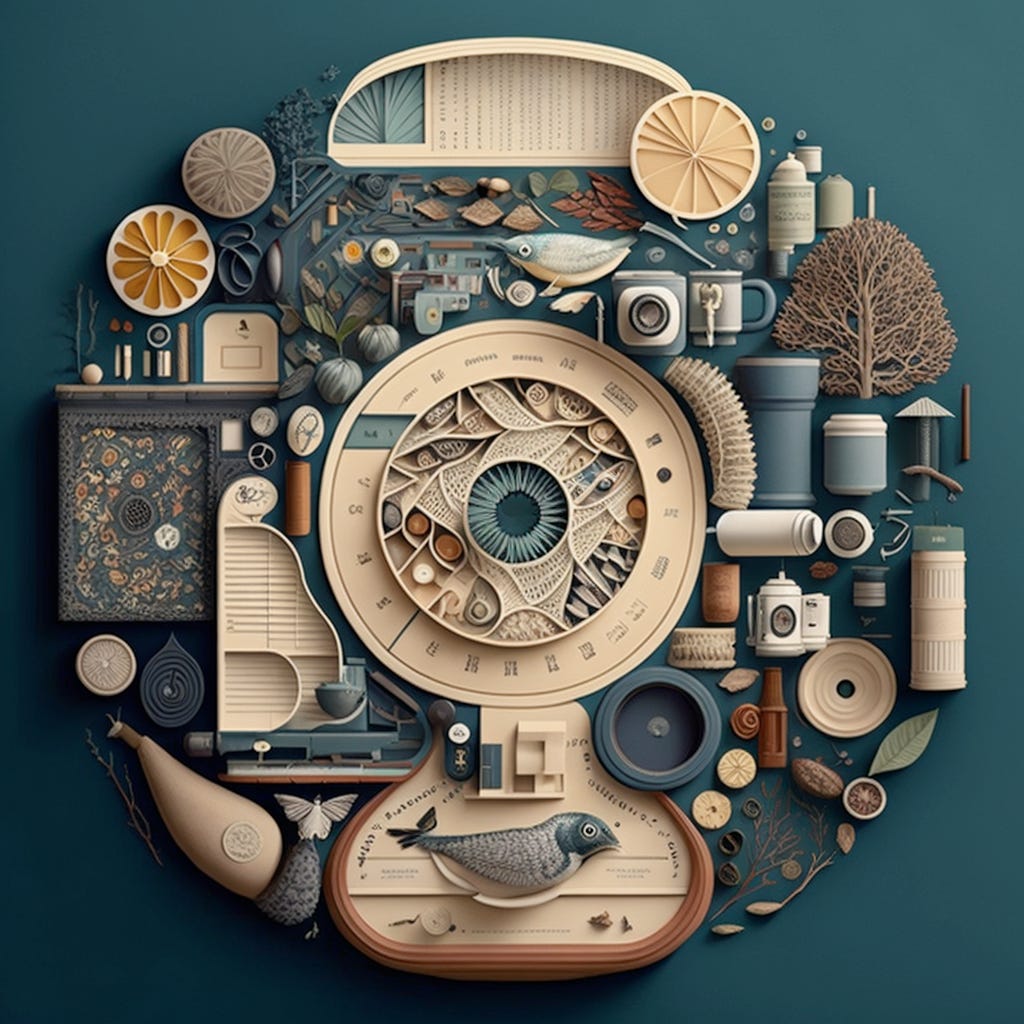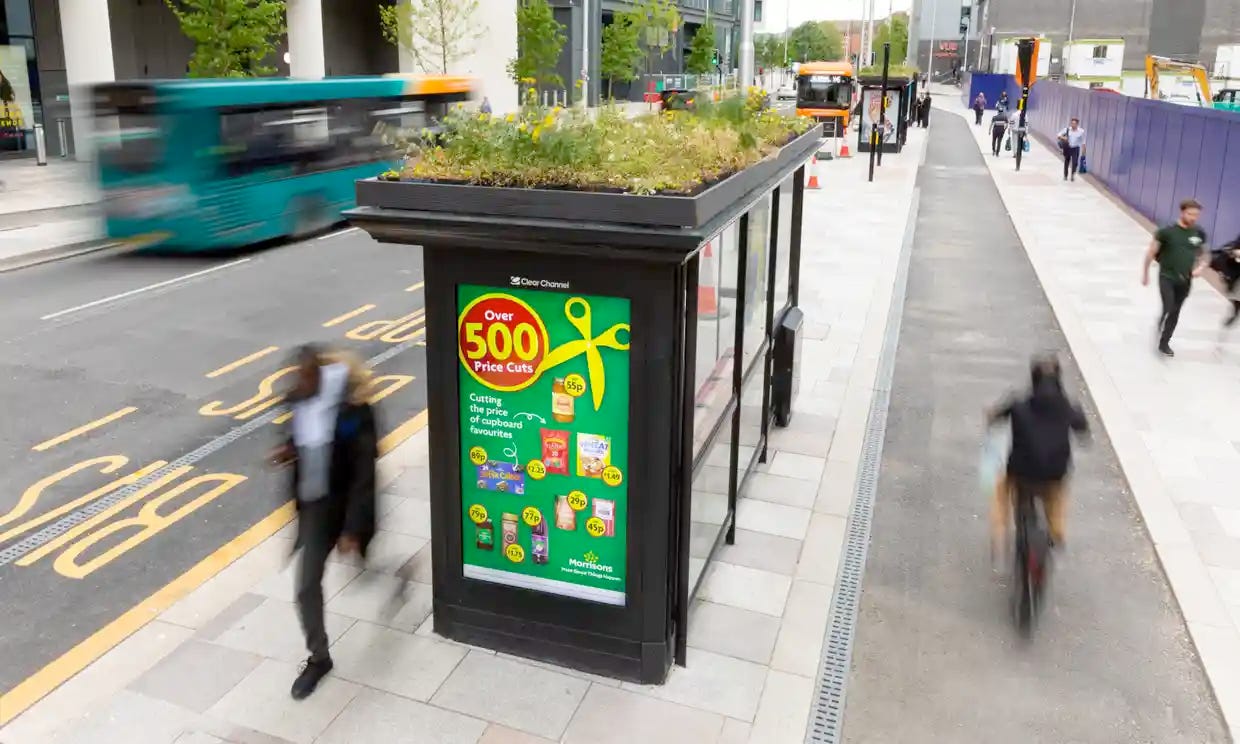🌀🗞 The FLUX Review, Ep. 86
February 9th, 2023

Episode 86 — February 9th, 2023 — Available at read.fluxcollective.org/p/86
Contributors to this issue: Erika Rice Scherpelz, Ben Mathes, Neel Mehta, a.r. Routh, Boris Smus
Additional insights from: Ade Oshineye, Gordon Brander, Stefano Mazzocchi, Justin Quimby, Dimitri Glazkov, Alex Komoroske, Robinson Eaton, Spencer Pitman, Julka Almquist, Scott Schaffter, Lisie Lillianfeld, Samuel Arbesman, Dart Lindsley, Jon Lebensold
We’re a ragtag band of systems thinkers who have been dedicating our early mornings to finding new lenses to help you make sense of the complex world we live in. This newsletter is a collection of patterns we’ve noticed in recent weeks.
“Science-fiction yesterday, fact today — obsolete tomorrow.”
— Otto O. Binder
📝🙌 Spreadsheet all the things? How about five of ‘em?
It’s mid-quarter. You’re dealing with 20 projects across 15 teams, all deeply interwoven. You want to wrangle the mess, so you put in some process to make sense of the complex situation you’re in.
But there’s a catch: your initial intuition is to sort all those 20 projects and teams into buckets and schedule meetings on meetings on meetings, all so you can make sense of the evolving mess in totality. But you cannot do that. Nobody can. The situation changes faster than you can learn about it.
But you can’t just not try. Your skip-level manager needs a coherent picture to give to their skip-level manager. How can you subtly tweak your approach to answer the key questions without getting stuck in the morass of trying to understand everything all at once?
One tool is to focus on getting the process in place for the top five(-ish) priorities first. While you are focusing on the top five, you’ll inevitably learn something new and change your process. Fortunately, you’ll only have to redo the five, not the full list. The crux is to not try and do it all at once. As the process stabilizes, you can expand to more — or you might find that focusing on the top five is actually good enough. (A subtle rub is that picking the top five could turn into a deep analysis in its own right — which means you’ll be stymied before you even get going. You have to do the ranking in a Pareto fashion too.)
This is more than just an efficiency hack. It is a move from one way-of-knowing to another. You started from High Modernism: measure and rank all the things! The infeasibility of that in a constantly evolving system calls for a shift to Metamodernism: measure and rank well enough, accepting that you can’t know everything to measure and can’t rank everything. This shift isn’t about throwing out the tools of high modernism. Rather, it’s about knowing the limitations of our tools and thoughtfully applying the right amount of the right tool for the job.
🛣️🚩 Signposts
Clues that point to where our changing world might lead us.
🚏🎏 Strange phrases like “SolidGoldMagikarp” are breaking ChatGPT
Researchers have discovered that certain strange phrases, when put into ChatGPT, lead to bizarre results. Ask the chatbot about “TheNitromeFan” and it’ll say that “182 is a number, not a person”; mention “SolidGoldMagikarp” and it explains that “distribute” is a verb. The researchers speculate that this stems from quirks of ChatGPT’s training data. One internet sleuth noticed that these odd phrases exactly match the usernames of prominent members of a Reddit forum where people count to infinity. (The forum has recently passed 4,940,000.)
🚏🔋 Old EV batteries are being reused for solar power storage in California
Solar and wind power plants only produce power intermittently, so they need huge numbers of batteries to temporarily store excess electricity. One startup noticed that this dovetailed nicely with the rise of electric vehicles, which is creating a large market for used EV battery packs. So, the company deployed 1,300 former EV batteries to a solar farm outside Los Angeles; the firm’s CEO says this battery reuse technique can reduce power grids’ battery costs by about 40%.
🚏🧯 Self-driving cars are disrupting firefighters, buses, and trains in San Francisco
Self-driving taxis from GM’s Cruise division have been roaming wild around San Francisco, causing headaches along the way. One car started driving toward a house fire and almost drove over a hose that firefighters needed; a firefighter had to smash the car’s front window to get it to stop. Elsewhere in the city, five Cruise taxis stopped around a bus and prevented it from moving; another taxi stopped on light-rail tracks and almost got hit by an oncoming train.
🚏🦋 Bus shelter roofs in the UK are turning into gardens for bees and butterflies
“Bee bus stops” — bus shelters with mini-gardens on top — are popular across much of Northern Europe as a way to promote native wildflowers, attract pollinators, absorb rainwater, and slightly cool the city down. The UK is joining the party by planning to add at least 1,000 bee bus stops, and cities in Canada and Australia have reportedly shown interest in these mini-gardens as well.
🚏🐒 NFT holders are paying $4000+ for high scores on a “skill-based mint” game
A new game by the makers of the Bored Ape Yacht Club is a “skill-based mint,” meaning that players who get higher scores will earn rarer (and presumably more valuable) NFTs. This has created a cottage industry of “boosters”: players who promise to get you high scores by hook or by crook, with one boosting service charging 2.5 Ether ($4200). Some enterprising boosters have been using bots, hacks, or assorted cheats to help them drive up their scores.
📖⏳ Worth your time
Some especially insightful pieces we’ve read, watched, and listened to recently.
Why Does ChatGPT Make Up Fake Academic Papers? (David Smerdon) — Investigates ChatGPT’s notorious habit of inventing fake academic references. Because large language models are fundamentally about “predicting the next words in a sequence,” they generate generic-sounding paper titles, attribute them to highly-cited authors, and guess publication dates based on when actual papers with similar names were published.
Annual Performance Reviews Ruin Everything (Elizabeth Ayer) — A long, multifaceted post that argues that annual performance reviews may diagnose problems correctly, but they usually place responsibility on the individual, rather than on the organization itself or a broader system. As W. Edwards Deming’s famous quote has it, “a bad system will beat a good person every time.”
Realism and China’s Balloon (Paul Poast) — An international relations professor proposes that we can understand the US’s response to China’s mysterious balloon through the lens of the four “brands of realism,” or how states think about protecting their sovereignty. He contrasts defensive, offensive, classical, and neoclassical realism.
Simulation Games Might Be What the World Needs Now (Dan Grover) — Argues that simulated models of reality are useful not because they provide a perfect map of the territory, but rather because they can facilitate a grounded, concrete conversation without the “scaffolding of narrative.” They almost always teach the valuable lesson that the world is more complicated than it looks.
Cultural Transmission Makes Animals Flexible, but Vulnerable (Knowable Magazine) — Researchers have found that non-human animals can learn from each other and even pass accumulated knowledge down through the generations. This kind of cultural learning helps them adapt to their environment more quickly than waiting for new genes to evolve, but it’s also more fragile: this knowledge can be easily lost if populations decline.
🔍🦤 Lens of the week
Introducing new ways to see the world and new tools to add to your mental arsenal.
This week’s lens: over-adaptation.
The dodo gets a bad rap. Despite their reputation for stupidity, dodos were likely birds of reasonable intelligence who were subject to overhunting, habitat destruction, and invasive species. They had little chance of survival and, as flightless island dwellers, no chance of escape. They were bound to their environment in a way that made it impossible for them to avoid extinction.
We humans can become over-adapted to our environment in a similar way. Like the dodo, we may be quite happy and successful in our niche. Specialization can feel like the path to greatest success — and in stable times, it is. However, when unexpected, often-traumatic changes come, if we’ve over-adapted to our current situation, we may find it nearly impossible to adapt to what’s new.
The difference between adaptation and over-adaptation is situational, so instead of saying “this might be a sign of over-adaptation,” we’ll instead provide a couple of questions for thinking about tradeoffs:
To think about if we’re making a choice that will leave us over-adapted: Does this decision enable you or limit you? If it limits you, how critical is the dimension being limited? How much benefit comes from the limitation? Is it a good tradeoff now? What changes might make it a bad tradeoff later?
To think about the degree to which we might already be over-adapted: Are you beholden to historical decisions? If so, do the assumptions of the past still hold? If they do not, should you change something about how you do things in the present? Can you?
These are diagnostic questions. There are no universally right or wrong answers. We are not searching for a path that leaves all options open. Most paths to well-being require investing some amount of depth. Rather, what we are looking to avoid is the world where the only alternative path is a dead end.
© 2023 The FLUX Collective. All rights reserved. Questions? Contact flux-collective@googlegroups.com.



